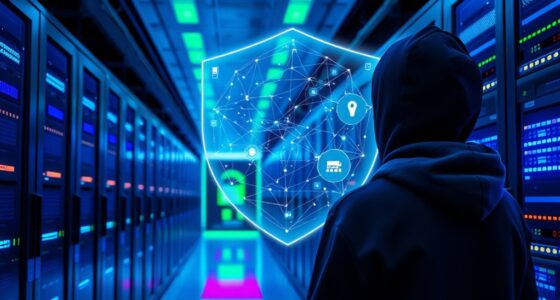The debate over Big Tech and national security centers on balancing regulation and support for tech giants. Some argue that their dominance threatens privacy, security, and democratic processes, calling for stronger antitrust measures. Others see them as essential innovators that drive progress and economic growth. As these companies hold vast data indispensable to national interests, concerns about foreign influence and cyber threats grow. To understand how this tension shapes policies and security efforts, keep exploring how regulation and innovation interact.
Key Takeaways
- The debate centers on whether Big Tech’s dominance threatens national security or if their innovation benefits overall security interests.
- Antitrust actions aim to curb monopolistic practices, but critics argue they may hinder technological leadership essential for security.
- Regulators emphasize data privacy and security, while some see excessive regulation as stifling innovation vital for national competitiveness.
- Concerns exist that breaking up Big Tech could weaken cybersecurity defenses and data management critical to national security.
- The “tech champion” perspective advocates for leveraging Big Tech’s capabilities to enhance security, contrasting with antitrust efforts to limit their power.

Have you ever wondered how big technology companies influence national security? These giants, like Google, Facebook, and Amazon, hold vast amounts of data that are essential to national interests. They collect, store, and analyze information on a scale never seen before, which makes data privacy a central concern. When personal data falls into the wrong hands—whether through breaches or malicious intent—it can be exploited for foreign influence campaigns. Adversaries may leverage this data to sway public opinion, interfere with elections, or destabilize societies. As a result, governments are increasingly scrutinizing how these companies handle user information and whether they’re doing enough to protect it. The challenge lies in balancing innovation and privacy while safeguarding national security. Too much regulation might stifle technological progress, but too little leaves critical vulnerabilities open. This tension fuels debates over whether Big Tech should be trusted to self-regulate or whether governments need to step in with stricter controls.
Foreign influence, in particular, underscores the importance of data privacy. Foreign actors often seek to exploit the data collected by these companies to manipulate public discourse or undermine trust in institutions. They might use targeted advertising or misinformation campaigns to sway elections or create social unrest. In this setting, Big Tech’s role becomes even more complex; their platforms are battlegrounds for influence operations, making them key players in national security strategies. Their control over data and algorithms can amplify foreign messages or suppress dissent, intentionally or not. Governments worry that lax oversight or uncoordinated policies could allow these malicious activities to flourish. Hence, the debate extends beyond antitrust issues—focused on market dominance—to broader concerns about the security implications of the data these companies hold and how they manage foreign interference. Additionally, the integration of Camper conversion technologies in vehicles exemplifies the broader trend of digital innovation impacting various sectors, including transportation and security. Moreover, many experts emphasize the importance of establishing data security standards to prevent breaches and protect sensitive information from malicious actors. Developing comprehensive policies around cybersecurity is crucial for addressing these evolving threats effectively. Furthermore, implementing regular audits can help ensure compliance and reduce vulnerabilities across these digital platforms.
Frequently Asked Questions
How Do Big Tech Companies Influence Government National Security Policies?
You might not realize it, but big tech companies influence government national security policies through lobbying influence, aiming to shape regulations in their favor. Their extensive lobbying efforts can lead to regulatory capture, where agencies prioritize corporate interests over public safety. This influence can sway policies, sometimes compromising national security priorities. As a result, their power impacts decisions on cybersecurity, data sharing, and surveillance, affecting how governments respond to emerging threats.
What Are the Cybersecurity Risks Posed by Monopolistic Tech Giants?
Oh, the joys of having a tech giant as your security guardian! Their monopolistic grip creates supply chain vulnerabilities, risking critical infrastructure. Plus, their massive surveillance capabilities threaten your privacy, turning your own data into a weapon. When one company controls so much, a cyberattack or data breach could have catastrophic effects, exposing sensitive info and compromising national security. It’s like trusting a fox to guard the henhouse—risky and reckless.
How Does Antitrust Enforcement Affect Innovation in the Tech Industry?
You might think antitrust enforcement stifles innovation, but it actually promotes healthy market competition. When monopolistic giants face scrutiny, they’re encouraged to innovate more through a stronger patent strategy and fairer competition. This fosters a dynamic environment where new ideas flourish, preventing stagnation. Ultimately, enforcing antitrust laws helps you benefit from diverse, innovative products and services, rather than being limited by the dominance of a few big players.
Can Breaking up Big Tech Companies Enhance National Security?
Breaking up big tech companies can boost national security by increasing market competition. When fewer dominant players control key sectors, it reduces the risk of systemic vulnerabilities and monopolistic behaviors that could be exploited. As a result, your access to diverse services improves, and you gain more consumer benefits. You also benefit from a more resilient tech ecosystem, which is less susceptible to single points of failure, ultimately strengthening your national security.
What Role Does Data Privacy Play in the Security Debate?
Imagine a world where your personal data is as fragile as a Victorian lace curtain. Privacy concerns are central to the security debate because safeguarding your personal data helps prevent breaches and misuse. When data privacy is prioritized, you gain trust that your information won’t be exploited, strengthening overall security. Conversely, neglecting privacy can expose vulnerabilities, making it easier for malicious actors to compromise systems and threaten national security.
Conclusion
So, you see, as Big Tech juggles national security and antitrust, it’s clear they’re playing both sides, like a cat with a laser pointer—chasing shadows and pretending to be in control. Will they tighten their grip or let the spotlight flicker? Either way, you can bet the show will go on, with a dash of drama, a sprinkle of scandal, and an audience left wondering who’s really steering the ship. Ah, the tech tango—so charmingly unpredictable.









